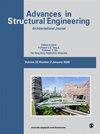带中心体和附属装置的全柔性航天器姿态控制递归动态建模
IF 2
4区 工程技术
引用次数: 0
摘要
由中心体和柔性附肢组成的航天器是一个典型的刚柔耦合系统。目前的建模方法通常将中心体视为刚性。随着中心体变得越来越大、越来越灵活,中心体的弹性变形可能不容忽视。本研究考虑了中心体的柔性效应,基于递归运动学,建立了全柔性航天器轨道、姿态和弹性变形的完整耦合动力学模型。与传统方法相比,该模型的广义坐标维度更小,能更清晰地揭示附属物与中心体之间的运动学关系。通过将典型工况下的仿真结果与 ADAMS 软件进行比较,验证了所建模型的正确性。使用 PD 控制器控制航天器的姿态,并详细比较了三种不同刚柔设置的模型。讨论了系统在失控和受控状态下的动态响应。数值模拟结果表明,中心体的柔性对航天器的姿态响应、附属装置的柔性振动和姿态控制精度有一定影响。本文章由计算机程序翻译,如有差异,请以英文原文为准。
Recursive dynamic modeling for attitude control of fully flexible spacecraft with central body and appendages
A spacecraft composed of a central body and flexible appendages is a typical rigid-flexible coupling system. Current modeling methods generally regard the central body as rigid. As the central body becomes larger and more flexible, the elastic deformation of the central body may not be ignored. In this study, considering the flexibility effect of the central body and based on the recursive kinematics, a complete coupled dynamic model of the orbit, attitude, and elastic deformation of a fully flexible spacecraft is established. Compared with traditional methods, the model has smaller generalized coordinate dimension and can more clearly reveal the kinematic relationship between the appendages and the central body. By comparing the simulation results of typical working conditions with the ADAMS software, the correctness of the built model is verified. The PD controller for the attitude of the spacecraft is used, and three models of different rigid/flexible settings are compared in detail. The dynamic response of the system in uncontrolled and controlled states are discussed. Numerical simulation results show that the flexibility of the central body poses a certain influence on the attitude response of the spacecraft, the flexible vibration of the appendages, and the attitude control accuracy.
求助全文
通过发布文献求助,成功后即可免费获取论文全文。
去求助
来源期刊

Advances in Mechanical Engineering
Engineering-Mechanical Engineering
自引率
4.80%
发文量
353
期刊介绍:
Advances in Mechanical Engineering (AIME) is a JCR Ranked, peer-reviewed, open access journal which publishes a wide range of original research and review articles. The journal Editorial Board welcomes manuscripts in both fundamental and applied research areas, and encourages submissions which contribute novel and innovative insights to the field of mechanical engineering
 求助内容:
求助内容: 应助结果提醒方式:
应助结果提醒方式:


